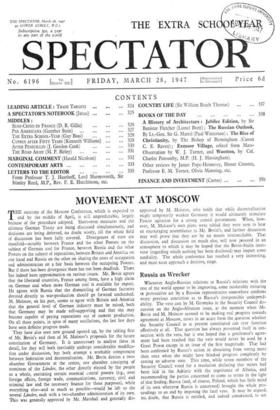Russia as Wrecker
Whenever Anglo-Russian relations or Russia's relations with the rest of the world appear to be improving, some intolerably irritating or provocative act by a Russian representative somewhere confirms every previous conviction as to Russia's irresponsible undepend- ability. The veto cast by M. Gromyko in the Security Council dis- cussion on the Anglo-Albanian issue, at the moment when Mr. Bevin and M. Molotov seemed to be making real progress towards agreement at Moscow, raises in an acute form the ,question whether the Security Council as at present constituted can ever function effectively at all. That question has always presented itself in con- nection with the veto, but it was hoped that a gentlemen's agree- ment had been reached that the veto would never be used by a Great Power. except in an issue of the first magnitude. That had been confirmed by Russia's action in abstaining from voting more than once when she might have blocked progress completely by casting an adverse vote. This time, while seven members of the Security Council voted for a resolution declaring that mines had been laid in the Adriatic with the cognisance of Albania, and recommending the parties concerned to come to terms in the light of that finding, Russia (and, of course, Poland, which has little mind of its own wherever Russia is concerned) brought the whole pro- ceedings to an end by imposing the fatal veto. It may be argued, no., doubt, that Russia is entitled, and indeed constrained, to act
according to her convictions. But it is not credible that time after tune conscience should impel her to take a line of her own, a line accordant with her general political interests, on questions where the rest of the Security Council, or some other body, having no interest except justice to consider, differ radically from her. Albania is a conspicuous case in point. Russia, and Russia alone among the Great Powers, has been pressing for Albania's admission to the United Nations. Russia, and Russia alone, has been pressing for Albania's admission to the discussions on the German Treaty. When the British case against Albania came before the Security Council, sitting in a strictly judicial capacity, Russia's probable atti- tude caused natural anxiety. She has confirmed the worst fears. The evidence in the case was overwhelming. It must have been as plain in Russian as in any other eyes. But Albania is Russia's protege, and Russia vetoes a conclusion condemning Albania. Let this be repeated many times and the United Nations may as well go out of business.



































